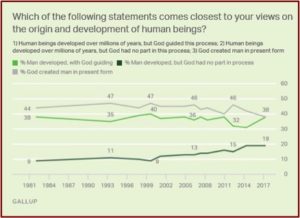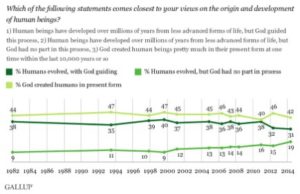Their Way or the Highway
Writing for Christianity Today, Tim Stafford related what he thought was the most sobering moment of the BioLogos “Theology of Celebration” conference held in March of 2012. That was when David Kinnaman of Barna Research presented findings that more than half of U.S. pastors profess a 6-day, 24-hour creation view of Genesis 1. Fewer than one in five followed the BioLogos view, affirming an evolutionary process as God’s method of creation. The cited statistics illustrate the ongoing dispute within conservative Christian circles on how to interpret Genesis 1 and the role (if any) of evolutionary processes in creation.
BioLogos also posted an essay by Tim Keller, who was one of the participants at the 2012 conference, “Creation, Evolution, and Christian Laypeople.” Keller wanted to provide guidance to pastors ministering in the cultural context where “Many secular and many evangelical voices agree on one ‘truism’—that if you are an orthodox Christian with a high view of the authority of the Bible, you cannot believe in evolution in any form at all.” He noted there were many Christians who questioned the underlying premise to this truism, namely that science and faith were irreconcilable. He added how this left “many Christian laypeople … confused because the voices arguing that Biblical orthodoxy and evolution are mutually exclusive are louder and more prominent than any others.”
Keller sought to describe in his essay how Christians could approach three of the main difficulties presented by the current scientific account of biological evolution for orthodox Christians. Those three difficulties were: Biblical authority, the confusion of biology and philosophy, and the historicity of Adam and Eve. In his concluding thoughts Keller cited Psalm 19 and Romans 1, which teach: “that God’s glory is revealed as we study his creation.” Nevertheless, he said, we must interpret the book of nature by the book of God. His conclusion was that Christians who seek to correlate Scripture and science “must be a ‘bigger tent’ than either the anti-scientific religionists or the anti-religious scientists.”
He’s faced strong criticism of his paper from several creationist sources. For example, Lita Cosner of Creation Ministries International said he was struck by the weakness of Keller’s assertions. He questioned Keller’s understanding of Genesis and implied he had subordinated Scripture to science. E.S. Williams on The New Calvinists said Keller was a firm believer in theistic evolution who promoted “this false view of creation in the Christian Church.”
Ken Ham was more oblique, saying Keller had misrepresented or taken a shot at him. He also implied Keller had a low view of Scripture for Genesis 1-11 because he didn’t agree with Ham’s (Answers in Genesis’s) interpretation of those chapters. “For Genesis 1–11, they allow man’s fallible beliefs about evolution or millions of years to override the clear words in Scripture so man’s ideas can be accommodated into Scripture.” The message is clear. Any disagreement a young earth creationist (YEC) understanding of Genesis 1-11 means you have a low view of biblical authority; or you’ve misinterpreted Scripture. It’s their way or the highway.
Ted Davis noted how theistic evolution or evolutionary creation has been controversial among Christians for over one hundred years. “It was contested hotly in the 1920s, when William Jennings Bryan sought to outlaw the teaching of evolution in public schools and universities.” Bryan saw theistic evolution as “an anesthetic which deadens the pain while the patient’s religion is being gradually removed.” Yet Answers in Genesis (AiG) said Bryan himself allowed “compromise on the days of creation.” In an excerpt of the trial transcript from the Scopes Trial, as Clarence Darrow cross examined him, Bryan said he did not did not think the days in Genesis 1 were necessarily twenty-four hour days; and that the creation could have been going on for a very long time. “It might have continued for millions of years.”
Along with Bryan, AiG’s list of past and present “compromised” evangelical leaders include: Charles Spurgeon, Charles Hodge, B. B. Warfield, James Montgomery Boice, Gleason Archer, Bill Bright, Norman Geisler, William Lane Craig, J. P. Moreland, Billy Graham, Bruce Waltke, and Tim Keller. “Those leaders all made the enormous mistake of interpreting Genesis differently than AiG.” As a result, they failed to contend for “the literal historical truth of Genesis 1–11, which is absolutely fundamental to all other doctrines in the Bible,” according to AiG.
It is astonishing that any given alternative to the YEC interpretation is painted as an unacceptable “compromise” arising from a cowardly desire to mute one’s faith in conformity to the world. This tendency to demonize legitimate differences of opinion or interpretation is surely one of the main reasons why so many young Christians are leaving their faith behind.
Ken Ham and AiG, of course, have a different opinion on why so many young people are leaving the church. In a 2016 article he co-authored for AiG, Ham said young people are not getting solid answers to their questions about the Bible. “Research” (AiG research?) shows how many of these questions “are related to Genesis and scientific issues such as evolution, long ages (millions of years), dinosaurs, and Noah’s Ark.”
These young people are not getting solid answers from church leaders and parents but, sadly, are often told they can believe in the big bang, millions of years, and evolution; they’re then admonished to reinterpret or ignore Genesis while being told to “trust in Jesus!” These young people recognize the inconsistency of reinterpreting the first book of the Bible and yet being expected to trust the other books that talk about Christ. If we can doubt and reinterpret Genesis, where do we stop doubting and reinterpreting?
AiG (Ham and his co-author) pointed out a Pew Research Center study that looked at “Why America’s ‘nones’ left religion behind.” A ‘none’ is a person who does not identify with a religious group. According to Pew, 78% of religious nones report they were raised in a particular faith before shedding it in adulthood. Forty-nine percent of these said they left their childhood faith over a lack of belief. But here we run into some apparent difficulties when interpreting the Pew data.
Pew Research said the 49% of religious nones whose lack of belief led them away from religion “include many respondents who mention ‘science’ as the reason they do not believe in religious teachings.” AiG reported this as Pew Research finding the same thing they did: “A large percent of young people are leaving the church because of questions about science that lead to doubts about God’s Word.” The Pew quote was from their above article, but the article itself didn’t give anything more specific than what was quoted. I did some searching on the Pew website and couldn’t find any further data on nones saying science was the reason they don’t now believe religious teachings, so we’ll assume what the article said is all that is available.
I don’t read the above two quotes as saying the same thing, as AiG does. There may be a significant number of young people who say they left the church or don’t believe in religious teachings because of science, but you can’t draw that conclusion from the Pew report. Pew didn’t give any data on that issue; they merely said many respondents gave ‘science’ as a reason they no longer believed in religious teachings. Another factor to consider is the Pew data is a reflection of all faiths, and not just Christianity. So it seems AiG is illegitimately co-opting the Pew findings to support their own views when they say Pew Research found the same thing they did. Then they proclaim: “If we can’t trust the historical portions of the Bible that deal with our origins, why should we trust the message of Jesus Christ? We’ve been saying this for years now—it’s nothing new!”
Research done by the Barna Group on “Six Reasons Young Christians Leave Church” indicated there was no single reason that dominated “the break-up between church and young adults.” However, there were six significant themes for why 59% disconnect after the age of fifteen. One of those six themes was how the church comes across as antagonistic to science. The research showed that many science-minded young Christians are struggling to find ways of staying faithful to their beliefs and to their professional calling in science. The Barna Group findings seem to be in line with Ted Davis’s above opinion on why many young Christians are leaving their faith—because of their church is demonizing legitimate differences of opinion or interpretation. The most common reasons given by young adults who felt disconnected from church or faith because of perceived antagonism to science were as follows:
“Christians are too confident they know all the answers” (35%). Three out of ten young adults with a Christian background feel that “churches are out of step with the scientific world we live in” (29%). Another one-quarter embrace the perception that “Christianity is anti-science” (25%). And nearly the same proportion (23%) said they have “been turned off by the creation-versus-evolution debate.”
There were five other reasons in addition to how churches come across as antagonistic to science in the Barna Group findings. So perceived antagonism with science is only one of six significant themes why young Christians disconnect from church life. It is a factor, but can’t be said to be the primary reason. Now let’s look at the results of another Pew Research study: The Religious Landscape Study, which “surveys more than 35,000 Americans from all 50 states about their religious affiliations, beliefs and practices and social and political views.” One of the social questions was on the participant’s views on evolution.
Among Christians, 42% said humans always existed in their present form, 5% said they didn’t know, but 54% said humans evolved in one way or another. Twenty-one percent said humans evolved through natural processes, 29% said they evolved due to God’s design, and 4% said they evolved but didn’t know ho it happened.
Most evangelical Protestants (57%) said humans always existed in their present form, 5% said they didn’t know, but 38% said humans evolved in one way or another. Eleven percent said humans evolved through natural processes, 25% said they evolved due to God’s design, and 2% said they evolved but didn’t know how it happened.
Another question asked in the Religious Landscape Study was on interpreting Scripture. Among Christians, 39% said the Bible was the Word of God and should be taken literally; 33% said the Bible was the Word of God, but not everything had to be taken literally; 18% said is was not the word of God; the rest weren’t sure in one way or another.
Most evangelical Protestants (55%) said the Bible was the Word of God and should be taken literally; 29% said the Bible was the Word of God, but not everything had to be taken literally; 8% said is was not the word of God; the rest weren’t sure in one way or another.
A literal interpretation of the Bible and believing humans always existed in their present form are beliefs consistent with a YEC position on creation. And the percentages of evangelical Protestants holding those beliefs corresponds to the Barna Group research reported above, that half of U.S. pastors profess a 6-day, 24-hour creation view of Genesis 1. Yet there are significant percentages of evangelical Protestants (38%) who hold to some form of human evolutionary development and believe that while the Bible is the Word of God, not everything had to be taken literally (29%).
Despite the detractors, it seems that Tim Keller’s advice in “Creation, Evolution, and Christian Laypeople” is particularly relevant to the church today. When Christians draw the line of orthodoxy at a literal interpretation of Genesis 1 to 11 and deny the possibility of a creation older than a few thousand years, they make their tent too small and in the process send those who can’t agree on their way. Hopefully they will encounter a pastor and a church who are trying to minister in the manner suggested by Keller.







